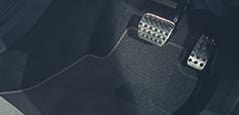Car battery leaking: Advice and tips

Car batteries contain a sulphuric acid solution that is highly toxic and corrosive. It is therefore vital you handle leaking car batteries with extreme care and attention and for safety reasons, we advise you use protective eyewear and gloves. Always ensure a leaking car battery is stored in a safe and secure manner, well away from children and pets till disposed of correctly.
It is unusual for car battery acid to leak if it is functioning normally; however, there are tell-tale signs that can indicate a car battery leak.
Cracks in the battery casing and visible evidence of fluid dripping from these fractures.
There is bubbling liquid seeping through the cell caps.
The battery is warped, inflated or appears distorted.
If you notice any of these conditions it means the battery is damaged and should be removed and replaced immediately.
Should you come into direct contact with the contents of a leaking car battery, wash the solution off your skin immediately in cold water. If you get it in your eyes, flush thoroughly with water and seek medical advice and attention.
Unless they are physically damaged or over-charged, car batteries typically should not leak. Car batteries do not last forever however, and as a rule of thumb they should be replaced approximately every three to five years. The longer a car battery is in use, the more unreliable and prone to leakages they become. For this reason they should be checked at frequent intervals.
When a car battery leaks acid, it is usually through the cell caps on the top of the battery, or due to damage to the body.
Overcharging your car’s battery is another reason for car battery acid leakage. Smart battery chargers detect and give signals to show when a battery is charged to full capacity to avoid this.
Extreme cold weather is also a factor that can lead to a car battery leak. Under such conditions the car battery acid inside may begin to freeze and cause the body of the battery to expand, putting pressure on the cells, similar to water pipes that burst in winter weather. Although this is unlikely to happen, it can still occur, which may result in acid leakage. For more information see our article on Car batteries, Cold Weather and Winter Tips and Advice.
Car batteries contain a solution of water and acid. Under extreme cold conditions this liquid mixture can separate.
Problems may occur if you top up a battery with distilled water and over-fill it. Those are the only times where it would be likely that any liquid coming out of a battery would be water. For the most part batteries leak acid, a dangerous substance you should avoid contact with.
Many car batteries today are sealed ‘maintenance free’ units. Sealed unit batteries have a slightly different chemistry make up and consume less water than the conventional, older type of battery and therefore do not need periodic topping up with water. However, even these modern day batteries may become damaged and leak. Sealed unit batteries too have a life cycle and will eventually die and need replacing.
Your local recycling centre is usually the best port of call in the first instance, or the garage from where you purchased your replacement battery. Most other garages will dispose of old and leaking batteries, though there may be a small charge for this service.
We hope this information has given you the information you need regarding leaking car batteries. However, if you suspect your battery is leaking, we advise that you replace it immediately. We supply batteries for just about every make and model of car on the road – see our battery finder chart, and find the battery that is right for your vehicle.
Whichever battery you have, make sure you use the right charger. Choose the correct charger for your battery by clicking on the link, or if you would prefer to speak with one of our advisors regarding the appropriate battery or charger for your vehicle, then give us a call on 0800 8620676. We are here to help.





